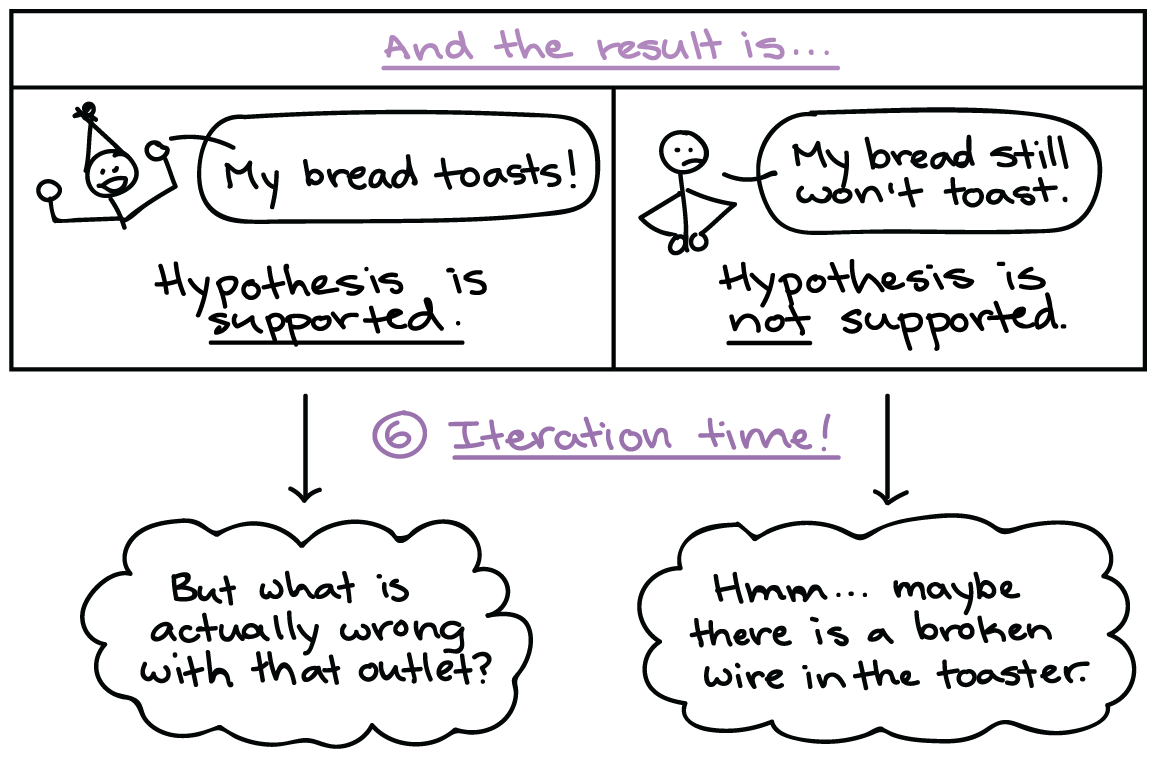A logical technique is a technique to evaluate takes a look at variable to make speculation and to hypothesize regulations. The researcher makes use of an inductive process which includes guessing joined with an accumulation of statistics and facts to get to the truth. It begins with belief, at that factor hypothesis and afterward examines is done to approve it. This strategy can likewise be considered as quality known structures to think about our well-known environment. The best issue about logical technique is that it approves its personal idea as well as opens to refine, modify, extend or maybe reject the hypothesis (Zhou, 2016).
The logical approach has five fundamental strides, in addition to at least one input step:
- Make an observation.
- Ask a question.
- Form a hypothesis or testable explanation.
- Make a prediction based on the hypothesis.
- Test the prediction.
- Iterate: use the results to make new hypotheses or predictions.
The logical technique is utilized as a part of all sciences—including science, material science, topography, and brain research. The researchers in these fields make diverse inquiries and perform distinctive tests. Be that as it may, they utilize a similar center way to deal with discovering answers that are coherent and upheld by confirming (Chang, 2016).
One of the particular issues which we look in our regular daily existence is talked about underneath:
Make an Observation
We must count on that you are having two cuts of bread, located these pieces into the toaster and then pressed the catch. However, the bread is not toasted.
Ask Question
Why did my bread not get toasted?
Purpose a Hypothesis
A speculation is a capacity reaction to the inquiry, one that may be one approach or any other be attempted. For instance, our principle for this situation may be that the toast failed to toast in mild of the reality that the electric outlet is damaged.
This hypothesis isn’t really the appropriate explanation. instead, it is an attainable explanation that we can take a look at to test whether or not it’s miles likely proper, or on the occasion that we must make another hypothesis.
Make Prediction
An expectation is a result we’d hope to check whether the theory is right. For this situation, we may foresee that if the electrical outlet is broken, at that point connecting the toaster to an alternate outlet should settle the issue.
Test the Prediction
To test the theory, we have to mention an objective factor play out an investigation related to the expectation. For example, for this situation, we would connect the toaster to an alternate outlet and check whether it toasts.
- If the toaster toasts, at that point the theory is upheld—likely right.
- If the toaster doesn’t toast, at that point the theory isn’t upheld—likely off-base.
The consequences of a test may bolster or repudiate—contradict—a theory. Results that help a theory can’t decisively demonstrate that it’s right, yet they do mean it’s probably going to be right. Then again, it comes about negate a speculation, that theory is presumably not right. Unless there was an imperfection in the test—a plausibility we ought to dependably consider—a conflicting outcome implies that we can dispose of the theory and search for another one. How can it be that we can’t indisputably demonstrate a theory? What’s more, would we be able to really discredit a theory?
One key refinement here is between what’s sensibly conceivable and what’s for all intents and purposes conceivable. Sensibly, it’s difficult to demonstrate a theory, yet conceivable to refute one. For all intents and purposes, it’s trying to either demonstrate or negate a theory past the smallest uncertainty (Zhang & Zhang, 2014).
Iterate
The last advance of the logical technique is to think about our outcomes and utilize them to direct our subsequent stages.
- If the hypothesis was reinforced, we may additionally do more exams to verify it or reconsider it to be more unique. for example, we may also discover why the outlet is damaged.
- If the principle turned into no longer upheld, we would consider any other speculation. For example, the subsequent speculation can be that there is a softened wire up the toaster.
An awful lot of the time, the logical method is an iterative system. at the end of the day, it is a cycle in place of a direct line. It is for the maximum element recounted that no much less than 3 components are required for important wondering and basic leadership: a records base, enough level of reasoning and relational competencies, and a taken care of our approach or method to address problems. A database is certainly one of a type to every trouble and no vast proclamations are in all likelihood going to be applicable other than the man or woman or amassing ought to grasp the realities, thoughts, and standards pertinent to the particular situation and feature the potential to apply them. However, several analysts have pondered the importance of reasoning and relational competencies because the established order for vital thinking and fundamental leadership and have portrayed various endeavors to decorate them. without advancement of those talents, powerful execution of the process mentioned in this paper seems to be greater tough (Angler, 2017).
Also, the improvement of a person’s basic leadership forces can be upgraded by progressing through the procedure with others in a gathering circumstance. Furthermore, the advancement of a person’s basic leadership forces can be improved by progressing through the procedure with others in a gathering circumstance.
References
Angler, M. W. (2017). Science Journalism: An Introduction. Taylor & Francis. Retrieved from https://books.google.com.pk/books?id=k_8nDwAAQBAJ
Chang, M. (2016). Principles of Scientific Methods. CRC Press. Retrieved from https://books.google.com.pk/books?id=vY7SBQAAQBAJ
Zhang, L., & Zhang, B. (2014). Quotient Space Based Problem Solving: A Theoretical Foundation of Granular Computing. Elsevier Science. Retrieved from https://books.google.com.pk/books?id=0CNRAgAAQBAJ
Zhou, C. (2016). Handbook of Research on Creative Problem-Solving Skill Development in Higher Education. IGI Global. Retrieved from https://books.google.com.pk/books?id=9mgeDQAAQBAJ











